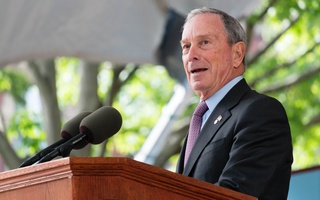The Harvard Kennedy School of Government has raised $570 million for its ongoing fundraising drive, surpassing its overall goal of $500 million, according to Dean Douglas W. Elmendorf.
The school raised $336 million during the “quiet phase” of its campaign, which publicly launched in May 2014. The campaign is part of a record-breaking University-wide $6.5 billion fundraising effort, begun in 2013, which has already surpassed its overall goal.
Elmendorf said his predecessor, David T. Ellwood ’75, and the school’s development team “were incredibly effective at explaining to people why the mission of the Kennedy School matters and how they could help.”
“We are now up to $570 million, which is beyond the original target, but our goal is not to hit a particular dollar value,” Elmendorf, who assumed his deanship in January, said. “It is to find support for the worthwhile ideas that we have here, and people are responding to that.”
The money raised in the capital campaign will support a number of Kennedy School initiatives, most visibly the construction and remodeling of portions of their JFK Street campus. The construction will add six new classrooms, a dining area, open study spaces, and a redesigned courtyard.
Elmendorf said the construction is “going very well” and that the project is “on time and on budget.” The estimated budget for the project is $126 million.
Campaign funding will also support research on digital technology, according to Elmendorf. He said the school has focused on this research because of increasing interest in cyber security and how digital journalism shapes public opinion.
“Digital technology is transforming the way we are doing business, but governments are lagging on the way they are using digital technology to deliver governance, benefits, and services,” he said.
Elmendorf said the school may use funding to invite experts who understand how digital technology works inside their own political spheres.
The Kennedy School is also focusing on what it has termed “social innovation,” which, according to Elmendorf, concerns the question of who should be solving problems—the government, the private sector, or others. In addition, the school is emphasizing developing strategies to “increase economic opportunity” for people.
A $32 million gift from Bloomberg Philanthropies in August will fund a joint program between the Kennedy School and the Business School for mayors and mayoral aides that Elmendorf said will focus on teaching current mayors how to be most effective in their positions.
Most of the Kennedy School’s $570 million was not donated by alumni. Major gifts from non-alumni donors have included the gift from Michael R. Bloomberg, who received his MBA from the Business School, and a $15 million gift from Robert A. Belfer, a graduate of the Law School, for whom the Kennedy School’s Belfer Center is named.
“Most of our gifts do not come from alumni, they come from people who are worried about some aspect of the world and think that we can help,” Elmendorf said.
—Staff writer Julia E. DeBenedictis can be reached at julia.debenedictis@thecrimson.com. Follow her on Twitter @julia_debene.
Read more in University News
In Uncertain Political Times, Faust Steps Up AdvocacyRecommended Articles
-
 Kennedy School Nears $500 Million Campaign Goal
Kennedy School Nears $500 Million Campaign Goal -
Two Gifts Will Fund Kennedy School FellowshipsThe Kennedy School of Government has received two significant gifts, $2 million from the Mallinckrodt Foundation and $2.93 million from the Charles Koch Foundation, that will go toward establishing student fellowships.
-
Kennedy School's Belfer Center Receives $15 MillionThe gift by investor Robert A. Belfer and his family—for whom the Belfer Center for Science and International Affairs has been named since 1997—brings the Kennedy School's capital campaign total just short of its $500 million goal.
-
 Bloomberg Gives $32 Million for Mayoral Leadership Program
Bloomberg Gives $32 Million for Mayoral Leadership Program -
Kennedy School Raises $580 Million in Capital CampaignKennedy School Dean Douglas W. Elmendorf says the school will focus on funding student financial aid, an ongoing construction project set to finish next winter, and developing programs that engage with “digital technology and governance.”













